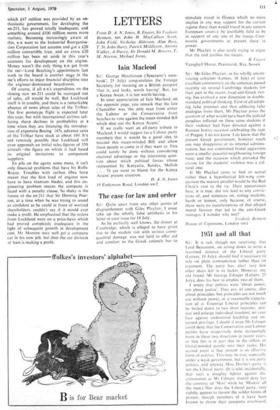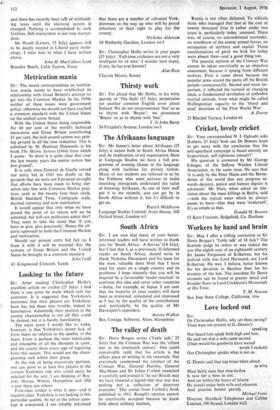1951 and all that
Sir: It is sad, though not surprising, that Lord Beaumont, on sitting down to write a reasoned delence of the Liberal party (Letters, 18 July), should find it necessary to rely on plain contradiction rather than on argument. The party has, alas! very few other shots left in its locker. However, my old friend, Mr George Edinger (Letters, 25 July), does his best to employ two of them.
wrote that politics were 'about power, not about justice'. They are, of course, also about principles, but principles are not much use without power, or a reasonable expecta- tion of it. Essential Liberal principles can be boiled down to two short maxims: pro- tect and enlarge individual freedom: set your face against undeserved hardship and un- earned privilege. I doubt if even Mr Edinger could deny that the Conservative and Labour parties have respectively done increasingly more in these two directions in recent years, or that this is in part due to the inflow of liberal-minded people into their ranks. His second point is that protest is an effective form of politics. This may he true, especially under a weak government, but it is not party politics, and anyway Miss Devlin's party is not the Liberal party. (It is odd, incidentally, that such a doughty fighter against dis- crimination as Mr Edinger should deny her the courtesy of 'Miss' while he 'Misters' all the men.) Nor does the Liberal party, very rightly, appear to favour the wilder forms of protest, though members of it have been known to throw their passports overboard,
and there has recently been talk of withhold. ing taxes until the electoral system is changed. Nothing is accomplished by such futilities. Self-martyrdom is not true martyr- dom.
Mr Woolf (Letters, 25 July) appears still to be deeply steeped in Liberal party myth- ology. I refer him to what I have written above.
John H. MacCallum Scott Bramlev Beech, Little Easton, Essex































 Previous page
Previous page